2009年杭州市中考英语试题及答案
- 格式:doc
- 大小:430.25 KB
- 文档页数:9
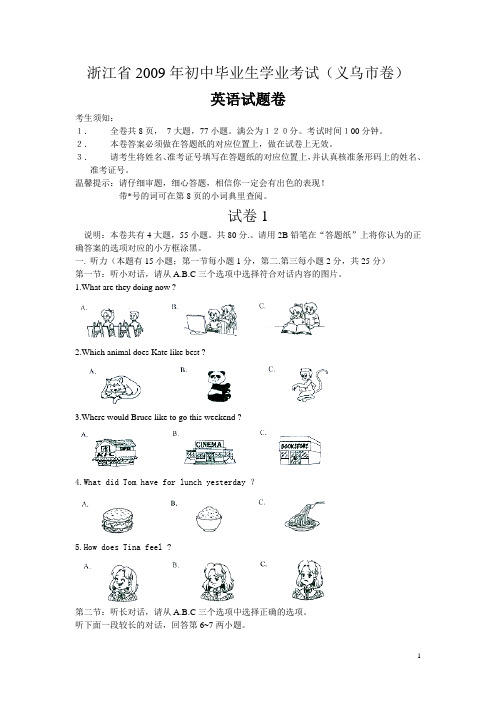
浙江省2009年初中毕业生学业考试(义乌市卷)英语试题卷考生须知:1.全卷共8页,7大题,77小题。
满公为120分。
考试时间100分钟。
2.本卷答案必须做在答题纸的对应位置上,做在试卷上无效。
3.请考生将姓名、准考证号填写在答题纸的对应位置上,并认真核准条形码上的姓名、准考证号。
温馨提示:请仔细审题,细心答题,相信你一定会有出色的表现!带*号的词可在第8页的小词典里查阅。
试卷1说明:本卷共有4大题,55小题。
共80分.。
请用2B铅笔在“答题纸”上将你认为的正确答案的选项对应的小方框涂黑。
一.听力(本题有15小题;第一节每小题1分,第二.第三每小题2分,共25分)第一节:听小对话,请从A.B.C三个选项中选择符合对话内容的图片。
1.What are they doing now ?2.Which animal does Kate like best ?3.Where would Bruce like to go this weekend ?4.What did Tom have for lunch yesterday ?5.How does Tina feel ?第二节:听长对话,请从A.B.C三个选项中选择正确的选项。
听下面一段较长的对话,回答第6~7两小题。
6.Who is the letter from ?A. JohnB. BettyC. Alice7.Where does the girl come from ?A. LondonB. BeijingC.New York听下面一段较长的对话,回答第8~10三小题。
8.Which club does the man want to jonh ?A.The English clubB. The Japanese clubC. The French club9.Wha t,s the man,s job ?A. A doctorB.A taxi driverC.A businessman10.Why does the man want to go john the club ?A. Because he wants to go abroadB. Because he wants to pass an English examC Because he wants to make more foreign friends第三节:听独白,请从A.B.C三个选项中选择正确的选项,完成信息记录表。
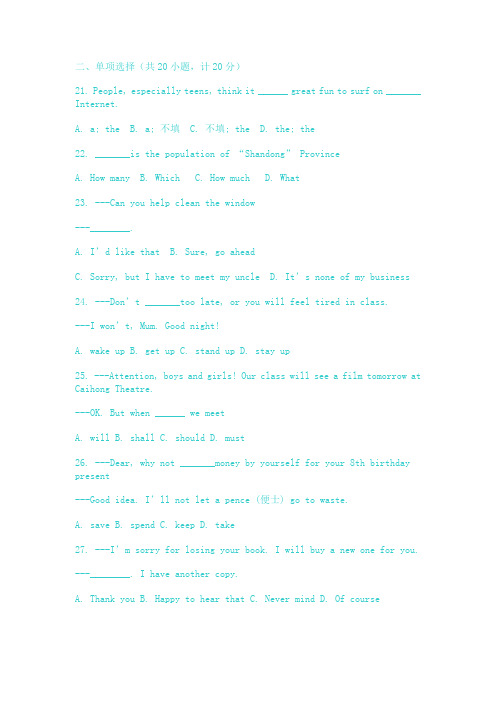
二、单项选择(共20小题,计20分)21. People, especially teens, think it ______ great fun to surf on _______ Internet.A. a; theB. a; 不填C. 不填; theD. the; the22. _______is the population of “Shandong” ProvinceA. How manyB. WhichC. How muchD. What23. ---Can you help clean the window---________.A. I’d like thatB. Sure, go aheadC. Sorry, but I have to meet my uncleD. It’s none of my business24. ---Don’t _______too late, or you will feel tired in class.---I won’t, Mum. Good night!A. wake upB. get upC. stand upD. stay up25. ---Attention, boys and girls! Our class will see a film tomorrow at Caihong Theatre.---OK. But when ______ we meetA. willB. shallC. shouldD. must26. ---Dear, why not _______money by yourself for your 8th birthday present---Good idea. I’ll not let a pence (便士) go to waste.A. saveB. spendC. keepD. take27. ---I’m sorry for losing your book. I will buy a new one for you.---________. I have another copy.A. Thank youB. Happy to hear thatC. Never mindD. Of course28. His handbag was stolen on his way back home. _______, his keys were on him.A. SurprisinglyB. SadlyC. LuckilyD. Hopefully29. ---David, what have you done with the poor dog He is wet through!---Not _______, mum! I never do the same thing a second time.A. myselfB. meC. himD. he30. ---Your picture is wonderful!---I worked for 8 hours _______I finished it.A. whenB. beforeC. whileD. after31. The question is ______he won’t listen to anyone.A. thatB. whetherC. ifD. when32. ---Lily! You are so special that you seem different from other girls.---Everyone in the world is different. So, just _______! It’s the best way of life.A. enjoy yourselfB. be yourselfC. help yourselfD. take care of yourself33. When I got his message, I called back, but there was no _______.A. answerB. ringC. voiceD. sound34. My teacher asked me if I was worried about the test and I said “No”. But ______I was.A. reallyB. hardlyC. badlyD. nearly35. You say the bridge is safe but I shall take care ________.A. after allB. in generalC. at the same timeD. all the same36. After school I found Mother was in bed sick. _______ Mother was ill,I should do something for her.A. SoB. ThoughC. SinceD. If37. ---Mary, it’s a _______that you didn’t travel with us. Ho w are you feeling now---I’m much better. Thank you.A. pleasureB. pityC. joyD. wonder38. ---Have you seen my toy car, Bill---It’s _______my way, so I put it _______.A. in; awayB. on; outC. in; outD. by; away39. The dog rushed to the nearest village _______it could get someone to help his dying ownerthere.A. whereB. whichC. thatD. so that40. It is not _______whether you fail or succeed in the game. The point is that you take part in itand enjoy it.A. necessaryB. importantC. trueD. right三、阅读理解(共20小题,计40分)(A)Dear Boris,Thanks for your nice letter.After I had spent a week with my English family, I slowly began to understand their English a little better. It’s very different from what I learned at school! Students in my group are from different cities of Britain and their dialects (方言) are different too! Some of their accents (口音) are quite strong and they also have their own words and expressions.But it’s not the language that’s different and surprising. Before I came to England I had thought that fish and chips were eaten every day. That’squite wrong! I get rather mad now when I hear all the foolish words about typical (典型的) English food.I had expected to see “London fog”. Do you remember our texts about it We had no idea that most o f this ‘thick fog’ disappeared many years ago when people stopped using coal in their homes. But the idea to speak about the weather was very helpful. The weather in London is really changeable.On the other hand habits are different. People tell me what is typically British here in London is not always typical in Wales or Scotland. Local habits and traditions are not the same as what we knew.But what is ordinary for all British is that they follow traditions. Probably Britain has more living signs of its past than many other countries. And people have always been proud of having ancient buildings in capitals, big cities and the countryside.I will tell you more about Britain in my other letters.Love from Britain,Pete41. What does Pete feel about the English languageA. At first it was difficult for him to understand people.B. He can understand different dialects and accents.C. He can speak English better than others.D. People can’t understand his English.42. Typical English food _______.A. makes people madB. can’t be seen nowC. is always fish and chipsD. is not what he knew43. The British people like to talk about weather because ________.A. there is thick fog in LondonB. they like the weather in BritainC. the weather changes a lotD. it can be helpful44. What do you know about habits in Britain from the passageA. They are not the same in different parts of Britain.B. Habits in Wales and Scotland are typically British.C. There are no typical British habits in Britain.D. All that is typically British is in London.45. Which is NOT true according to the passageA. What he’s seen is quite different from what he’d learnedB. British people like to follow traditions.C. Pete had learned about Britain before.D. Pete doesn’t like his life in B ritain.(B)I’m confused these days. We are taught at home and at school that using violence (暴力) is the least civilized (文明的) way to solve problems. For example, last week I thought about hitting my friend for winning a beautiful shell while we were playing at the beach. I talked with him instead and we came to an agreement. If two adults had a disagreement, and if they used violence towards each other in order to win, is it all rightWhen two countries disagree, they often fight a war. Why is using violence not okay at home, at school, or in your country but okay between countries So many people have been killed because of wars, not only soldiers but ordinary people, even small children and babies. And refugees (难民) exist, too.A war is a great violence, like two people fighting over a shell, just much bigger. Adults say they are fighting wars in order to solve problems and make peace. But can you really “make peace” by killing so many pe ople I don’t think bombs (炸弹) can reach people’s hearts and change them. Bombs can’t create love and caring, and that’s what we need in the world. Why do adults use violence so quickly Why can’t they use their wisdom (智慧) and talk it overAdults might say that things are not that easy. But they are the ones that teach us to be kind, not to hurt people, and not to kill. Why don’t they act as what they say---A page from a 12-tear-old boy, Joshua’s diary.46. At the beach, Joshua ________.A. hit his friendB. won a beautiful shellC. played with a beautiful shellD. came to an agreement with his friend47. Joshua hates wars between countries because ________.A. he is afraid of warsB. he doesn’t understand adultsC. wars create death and refugeesD. wars are not the only way to make peace48. What’s the key to peace in Joshua’s opinionA. Love and care for each other.B. Don’t use violence so quickly.C. Stop using bombs in wars.D. Don’t hurt or kill people in wars.49. From the reading we can see Joshua wants adults to ________.A. learn from childrenB. be children’s modelsC. be kind to childrenD. teach children how to solve problems50. Choose the best title (标题) for the passage.A. Adults and WarsB. How to Stop WarsC. Wars Can’t Make PeaceD. Ways of Solving Problems(C)ENJOY YOUR FAVOURITES IN STAR CINEMASeptemberFri-SunVoldemort: 14:00; 16:00Lord of the Rings (II) The Two Towers: 14:00; 16:00; 20:00; 22:00Mon-ThursThe Lion King, Shrek (II): 12:00; 14:00; 16:00; 20:00OctoberFri-SunGoblet of Fire: 14:00; 16:00Lord of the Rings (III) The Return of the King: 14:00; 16:00; 20:00; 22:00Mon-ThursLord of the Rings (II) The Two Towers: 12:00; 14:00; 16:00; 20:00Voldemort: 12:00; 14:00; 16:00Tickets must be booked any time up to 30 minutes before the film starts. Ticket holders are given seat numbers.Drinks are provided. Food may be bought from the shop and eaten in the area provided outside the cinema.Ticket price: Adults: $16; Children under 6: $6; Students under 16: $10Smoking is not allowed anywhere in the cinema. Mobile phones must be powered off.51. What film can you see on a Saturday night in OctoberA. Lord of the Rings (III) The Return of the King.B. Lord of the Rings (II) The Two Towers.C. The Lion King, Shrek (II).D. Voldemort.52. When can you see the film VoldemortA. Tuesday, October, 4pm.B. Tuesday, October, 10pm.C. Thursday, September, 8pm.D. Friday, September, 4am.53. How much will it cost for a family with two children (one is 5 and the other is 8) to see a filmA. $22.B. $30.C. $44.D. $48.54. When can people book ticketsA. The day before the film.B. Anytime before the film.C. An hour before the film.D. No later than half an hour before the film.55. What can you do in the cinemaA. Eat some food.B. Have some drinks.C. Make a phone call.D. Smoke in the area provided.(D)Throughout history, people had dreamed about joining England and France together. Even Napoleon had a plan to dig a tunnel (隧道) and reach England. One of the first people who tried to dig a tunnel under the Channel (英吉利海峡) was a French engineer called Albert Mathieu. His tunnel failed.In 1881, Colonel Beamont and Captain English from Britain also tried to dig a tunnel. Their tunnel went six kilometers into the Channel. Queen Victoria stopped them and said it was dangerous to connect with France. It was a very good tunnel, and it is still there today.The new tunnel (ready in 1993) is, in fact, three tunnels-two for trains and a “service tunnel” for fresh air to go in and for men who take care of the tunnels. The tunnels are fifty kilometers long, forty meters under water. Forty kilometers of tunnel are under the sea itself. They are the longest undersea tunnels in the world. Trains travel through the tunnels at 160 km/h. People drive their cars onto trains and the trains take them through the tunnel. Each train takes 1,500 people and there are trains every ten minutes.A special radio station called Channel Channel has started, because it is impossible to receive normal radio signals (信号) when you are under the sea. The station sends news to keep people up-to-date with the ‘world outside’ while they are in the tunnel.56. What was people’s dream about England and FranceA. Napoleon could reach England.B. Napoleon could dig a tunnel for them.C. Albert Mathieu would succeed.D. England and France could be joined together.57. Which is TRUE about the tunnel building in 1881A. The tunnel went six kilometers from France.B. Tunnel-building was a dangerous job.C. The old tunnel is still under the sea.D. The queen agreed to the digging plan.58. What’s the t raveling like in the tunnelA. Trains and cars can travel at 160 km/h.B. People can travel by trains through two tunnels.C. It takes ten minutes to go through the tunnel by train.D. People can drive their cars or take trains through the tunnel.59. Channel Channel has started to _________.A. tell people what the date isB. send news about people in the tunnelC. tell people news about the outside worldD. receive radio signals of the outside world60. The passage mainly tells us _________.A. the history of the Channel tunnelB. the importance of the Channel tunnelC. it’s hard work to dig an undersea tunnelD. the people who tried to dig the Channel tunnel第II卷(非选择题共45分)四、动词填空(共10空,计10分)阅读下面短文,用括号内所给动词的适当形式填空。
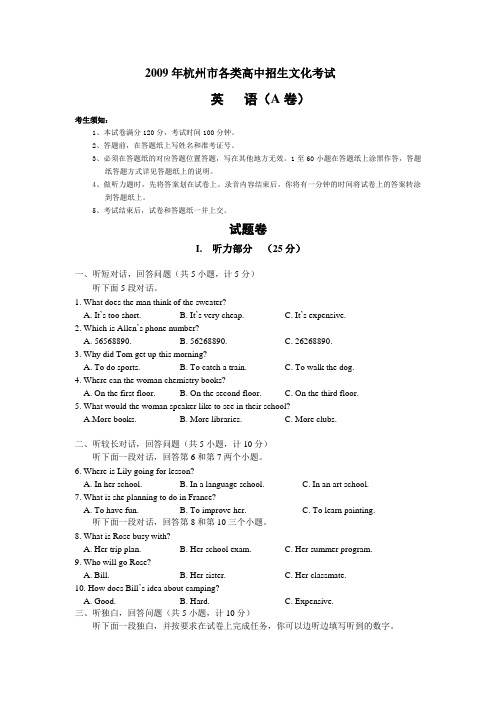
2009年杭州市各类高中招生文化考试英语(A卷)考生须知:1、本试卷满分120分,考试时间100分钟。
2、答题前,在答题纸上写姓名和准考证号。
3、必须在答题纸的对应答题位置答题,写在其他地方无效。
1至60小题在答题纸上涂黑作答,答题纸答题方式详见答题纸上的说明。
4、做听力题时,先将答案划在试卷上。
录音内容结束后,你将有一分钟的时间将试卷上的答案转涂到答题纸上。
5、考试结束后,试卷和答题纸一并上交。
试题卷I. 听力部分(25分)一、听短对话,回答问题(共5小题,计5分)听下面5段对话。
1. What does the man think of the sweater?A. It’s too short.B. It’s very cheap.C. It’s expensive.2. Which is Allen’s phone number?A. 56568890.B. 56268890.C. 26268890.3. Why did Tom get up this morning?A. To do sports.B. To catch a train.C. To walk the dog.4. Where can the woman chemistry books?A. On the first floor.B. On the second floor.C. On the third floor.5. What would the woman speaker like to see in their school?A. M ore books.B. More libraries.C. More clubs.二、听较长对话,回答问题(共5小题,计10分)听下面一段对话,回答第6和第7两个小题。
6. Where is Lily going for lesson?A. In her school.B. In a language school.C. In an art school.7. What is she planning to do in France?A. To have fun.B. To improve her.C. To learn painting.听下面一段对话,回答第8和第10三个小题。
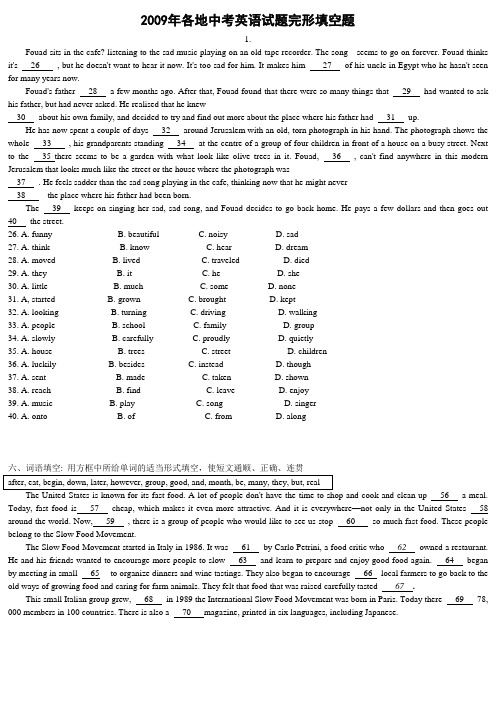
2009年各地中考英语试题完形填空题1.Fouad sits in the cafe? listening to the sad music playing on an old tape recorder. The song seems to go on forever. Fouad thinks it's 26 , but he doesn't want to hear it now. It's too sad for him. It makes him 27 of his uncle in Egypt who he hasn't seen for many years now.Fouad's father 28 a few months ago. After that, Fouad found that there were so many things that 29 had wanted to ask his father, but had never asked. He realised that he knew30 about his own family, and decided to try and find out more about the place where his father had 31 up.He has now spent a couple of days 32 around Jerusalem with an old, torn photograph in his hand. The photograph shows the whole 33 , his grandparents standing 34 at the centre of a group of four children in front of a house on a busy street. Next to the 35 there seems to be a garden with what look like olive trees in it. Fouad, 36 , can't find anywhere in this modern Jerusalem that looks much like the street or the house where the photograph was37 . He feels sadder than the sad song playing in the cafe, thinking now that he might never38 the place where his father had been born.The 39 keeps on singing her sad, sad song, and Fouad decides to go back home. He pays a few dollars and then goes out 40 the street.26. A. funny B. beautiful C. noisy D. sad27. A. think B. know C. hear D. dream28. A. moved B. lived C. traveled D. died29. A. they B. it C. he D. she30. A. little B. much C. some D. none31. A, started B. grown C. brought D. kept32. A. looking B. turning C. driving D. walking33. A. people B. school C. family D. group34. A. slowly B. carefully C. proudly D. quietly35. A. house B. trees C. street D. children36. A. luckily B. besides C. instead D. though37. A. sent B. made C. taken D. shown38. A. reach B. find C. leave D. enjoy39. A. music B. play C. song D. singer40. A. onto B. of C. from D. along六、词语填空: 用方框中所给单词的适当形式填空,使短文通顺、正确、连贯The Slow Food Movement started in Italy in 1986. It was 61 by Carlo Petrini, a food critic who 62 owned a restaurant. He and his friends wanted to encourage more people to slow 63 and learn to prepare and enjoy good food again. 64 began by meeting in small 65__ to organize dinners and wine tastings. They also began to encourage 66 local farmers to go back to the old ways of growing food and caring for farm animals. They felt that food that was raised carefully tasted 67 .This small Italian group grew, 68 in 1989 the International Slow Food Movement was born in Paris. Today there 69 78, 000 members in 100 countries. There is also a 70 magazine, printed in six languages, including Japanese.I have a good mother. She has always made sure we eat very 31 .We live 32 the sea and have fish about four times a 33 . We eat fresh fruit and vegetables every day. We don't eat 34 sugar or fat(脂肪). A lot of my school friends eat many sweets every day but I only eat a few. And I'm not too heavy, so I 35 have to be thinner.I'm quite healthy. I don't often get cold, 36 I had a bad cold and a high temperature last week because I played football in the 37 I don't often get things 38 flu(流感)either. Last winter almost all my classmates got flu—but I didn't. I don't get these things 39 I take a lot of exercise and I am very 40 . Two years ago I broke my 41 while I was playing football and I couldn't 42 my arm for a month. So as you can 43 from what I've said, I'm an 44 person. But there's one thing I really love—playing football. I'm captain of the class team at school. Because of this, I must have a good diet(饮食) ,and as I've said, this isn't a problem because my mother 45 us so well.31. A. slowly B. safely C. healthily D. quickly32. A. in B. under C. above D. near33. A. day B. week C. month D. year34. A. much B. any C. delicious D. good35. A. sometimes B. often C. always D. never36. A. so B. but C. and D. for37. A. rain B. sun C. field D. forest38. A. for B. like C. of D. with39. A. because B. while C. if D. when40. A. busy B. tall C. helpful D. strong41. A. foot B. arm C. hand D. head42. A. open B. pull C. move D. find43. A. hear B. see C. write D. describe44. A. ordinary B. important C. interesting D. exciting45. A. feeds B. trains C. invites D. interviews六、词语填空(本题有10小题,每小题1分。

2009杭州市江干区中考英语部分题型模拟卷(一)------天杭实验学校徐碧瑛张其咏一.听独白回答问题(共5小题,计10分)听下面一段独白,并按独白的要求在试卷上完成任务,你可以边听边完成任务。
然后你会看到5个问题和相关的选项。
请从每个问题A,B,C三个选项中选出最佳选项.听独白前你有25秒钟的时间阅读有关材料和5个小题.听完独白后, 你有25秒钟的时间来选择有关选项.独白连续读两遍.Your address: ________ Yan An Road.Multiply it by ___ You’ll get __________Add_____ You’ll get __________Multiply it by ___ You’ll get __________Add _______ You’ll get __________Add _______________ You’ll get __________Minus ________from the number The result is ________1.What’s the speaker most probably doing now?A. Having a partyB. Giving a lessonC. Having a match.2. Which subject is the speaker teaching?A. MathB. scienceC. English3. According to the trick, what number can you get if you are 10 years old and your housenumber is 73?A. 1073B. 7130C. 73104. What’s the secret of the trick?A. It’s impossible to know.B. By taking Step 2 and Step 4, the formula (公式) is your address numberⅹ2ⅹ50C. By taking all the steps except 1and 2, we get the formula 5ⅹ50+your age number+365-615=your age number.5. Which part of the result is the age number we used?A. the first part 20B. the last part 16C. the total of the two parts.二.单项选择(共15小题,计15分).从A,B,C,D四个选项中,选出可以填入空白处的最佳答案.( )1. —Students in this school always takes active part in sports after school.—That’s good.A. /B. aC. anD. the( )2. —What happened to you this morning?—The teacher asked me what my __________ was when I was late again.A. meaningB. ideaC. excuseD. answer( )3. —Let’s go hiking,______________?—Great.A. will youB. shall weC. aren’t youD. don’t you( )4. —______________do you like best?—The yellow one.A. WhatB. HowC. WhichD. Whom( )5. —Are you Mr. Black, manager here?—Yes. I ___________ here. What can I do for you?A. will workB. had workedC. workD. worked( )6. —Must I hand in my exercise book now, Mr. Li ?—No, you . You may give it to me tomorrow.A.needn’tB. mustn’tC. c an’tD. may( )7. —What do you think of the basketball match?—Wonderful. They have never played .A. bestB. betterC. worseD. worst( )8. —Where is your mother?—Oh, she will be back ____________10 minutes.A. afterB. inC. atD. during( )9. —What do they mean?—They want to know ___________ do to help us.A. what they canB. what can theyC. how they canD. how can they( )10. —How about going for a walk outside?—.A. I’d like toB. I would beC. I likeD. I do( )11. —What do people here do on weekends?—Well, some people like to stay at home, but ___________ like to go outside.A. anotherB. otherC. other oneD. others( )12. — What's on?— The lady there ___________ me of my English teacher. Her smile is so sweet.A. realizesB. thinksC. missesD. reminds( )13. —Where can I find Jack?—He the post officeA. had gone toB. has been toC. had been toD. has gone to( )14. —Today Ruth looks happy. Can’t you see?—Yes. She Rose in tennis yesterday afternoon.A. wonB. beatC. failedD. lost( )15. —Would you help me put away these things?—__________.A. Yes, quite right C. Never mindC. You're welcomeD. With pleasure三. 完型填空(共15小题,计15分).通读下面短文, 掌握其大意, 然后在各题所给的四个选项中选出一个最佳答案.Hero Li saves planeIf you were a pilot flying a plane, and suddenly the engine failed, would you eject( 弹出飞机), or stay in? For a pilot, the 1 is very difficult. If he ejects, he is safe, but the plane crashes( 坠毁). If he stays in the plane, he 2 his life.3 Chinese Air Force( 空军)polite Li Feng4 this choice during a training exercise.It was on March 7. He was flying a Jian-10(Flighter-10) at 4,500meters. A 5 appeared on the plane’s computer screen. He realized the plane might 6 at any moment. Li Feng did a quick check of the engine and asked to 7 . When the fighter was 7km away from the 8 , however, the 9 stopped working. It began to 10 at a speed of 25 meters a second. Li still had the chance to eject from the aircraft, but he decided not to. He was under great pressure. But he 11 to control the plane, land it and 12 it along the runway. The plane 13 the runway for 1,400 meters before stopping. The forced landing( 迫降)succeeded. It took 104 seconds. The plane wasn’t14 much.―You are a hero! Congratulations!‖ Li’s instructor 15 him after the landing. He said Li was a cool-headed pilot and very professional. The Air Force has decided to give Li Feng a medal for his outstanding performance.( )1. A. decision B. choice C. action D. method( )2. A. loses B. saves C. risks D. gives( )3. A. Recently B. Every day C. Lately D. At first( )4. A. took B. had C. saw D. faced( )5. A. message B. warning C. saying D. word( )6. A. fail B. fly C. leave D. fall( )7. A. stop B. return C. land D. eject( )8. A. ground B. sky C. airport D. instructor( )9. A. plane B. fighter C. engine D. time( )10. A. fall B. fly C. work D. land( )11. A. hoped B. wanted C. forced D. managed( )12. A. push B. drive C. ride D. control( )13. A. slipped down B. fell down C. jumped down D. taxied down( )14. A. damaged B. broken C. destroyed D. changed( )15. A. said B. messaged C. wrote D. praised四. 阅读理解(5小题,计10分).阅读下列短文, 从每题所给的四个选项中选出最佳答案.Many students want to know about the differences between American English and British English. How did these differences come about? There is no quick answer to this question. At first, the language in Britain and America was the same. In 1776,America became an independent country. After that, the language slowly began to change. For a long time, the language in America stayed the same, while the language in England changed. For example, 300years ago,the En glish talked about ―fall‖. Today, most British people talk about ―autumn‖, but Americans still talk about ―fall‖. In the same way Americans still use the expression ―I guess‖(meaning ―I think‖),just as the British did 300 years ago.At the same time, British English and American English started borrowing words from other languages, ending up with different words. For example, the British took ―typhoon‖ from Chinese, while the Americans took ―tornado‖ from Spanish.In 1828, Noah Webster published the first American dictionary. He wanted to make American English different from British English, so he changed the spelling of many words.That’s why the words colour, centre and traveler are spelt color, center and traveler in American English. Except for these differences in spelling, written English is more or less the same in both British and American English.The differences are greater in the spoken language . For example, Americans says dance/dæns/,and in southern England they say /dɑ:ns/. In America they pronounce not /nɑt/; in southern England they say /nɔt/.根据短文内容, 选择最佳答案.( ) 1. The message mainly tells us __________.A.The differences between American English and British English and theirdevelopment.B.when the language changed.C.who made American English different from British English.D.Borrowing words from other languages led to the differences.( ) 2. Which of the following is NOT true?A.The language began to change after America became an independent country.B.American English and British English were different 300 years ago.C.The first American dictionary written by Noah Webster came out in 1828.D.At first the language in British and America was the same.( ) 3. What does ―come about ‖ mean in the first paragraph?A. happenB. startC. end upD. develop( ) 4. It was _______ that changed the spelling of many words in his dictionary.A. British peopleB. the SpanishC. Noah WebsterD. Chinese( ) 5. According to paragraph 4 and 5 we know __________in both British and American English.A.the differences are greater in spoken language than in spelling.B.The differences are greater in spoken language than in written English.C.The differences between spelling and written English are almost the same.D.It’s true that there are no differences among the three.五.单词拼写。

往年浙江省杭州市中考英语真题及答案Ⅰ听力部分一、听短对话,回答问题(共5小题,计5分)听下面5段对话。
每段对话后有一个小题,从题中所给的A、B、C三个选项中选出最佳选项,并标在试题的相应位置。
听完每段对话后,你都有10秒钟的时间来回答有关小题和阅读下一小题。
每段对话仅读一遍。
1.Where is Alice now?A. At homeB. At the supermarketC. At school2.Who has got longer hair?A. SamB. TomC. Tina3.How is the weather today?A. WindyB. RainyC. Sunny4.What would the woman like to eat?A. The beef noodle B .the vegetable noodles C. The tomatonoodles5.When did the woman become an art teacher?A.In2004B. In2006C. In2008二、听较长对话,回答问题(共6小题,计12分)听下面一段对话,回答第6至8三个小题。
现在,你有15秒的时间阅读这三个小题。
6. How many hours does the woman probably spend on the Internet a week?A. About 2 or 3hoursB. About 3 or 4 hoursC. About 3 or 5 hours7. What does the woman like to do ?A. To surf the InternetB. To read e-mailC. To write letters in ink8. What do we know about the woman?A. She’s too busy to send any e-mailB. She gets some information on the Internet.C. She is looking through books in the library听下面一段对话,回答第9至11三个小题。
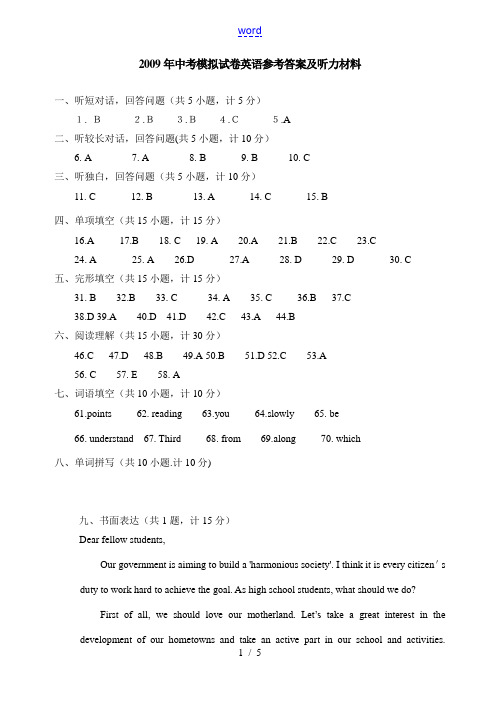
2009年中考模拟试卷英语参考答案及听力材料一、听短对话,回答问题(共5小题,计5分)1. B2.B3.B4.C5.A二、听较长对话,回答问题(共5小题,计10分)6. A7. A8. B9. B 10. C三、听独白,回答问题(共5小题,计10分)11. C 12. B 13. A 14. C 15. B四、单项填空(共15小题,计15分)16.A 17.B 18. C 19. A 20.A 21.B 22.C 23.C24. A 25. A 26.D 27.A 28. D 29. D 30. C五、完形填空(共15小题,计15分)31. B 32.B 33. C 34. A 35. C 36.B 37.C38.D 39.A 40.D 41.D 42.C 43.A 44.B六、阅读理解(共15小题,计30分)46.C 47.D 48.B 49.A 50.B 51.D 52.C 53.A56. C 57. E 58. A七、词语填空(共10小题,计10分)61.points 62. reading 63.you 64.slowly 65. be66. understand 67. Third 68. from 69.along 70. which八、单词拼写(共10小题.计10分)九、书面表达(共1题,计15分)Dear fellow students,Our government is aiming to build a 'harmonious society'. I think it is every citizen's duty to work hard to achieve the goal. As high school students, what should we do?First of all, we should love our motherland. Let’s take a great interest in the development of our hometowns and take an active part in our school and activities.Secondly, let’s fill the world with love. We should show our respect for old people, our parents and our teachers. We should also care for each other and help those in need. More importantly, all of us must be faithful and honest in our daily life. Finally, let’s work together to save energy and protect our natural environment, including animals, trees, flowers and grass. As for myself, I will study even harder and try my best to do all the above. Dear fellow students, let's start fight now and spare no effort/efforts to do a little bit every day, every hour, and every minute!Zhao Lei评分标准一、第1小题至第5小题,每题1分,不选、多选和错选不给分。
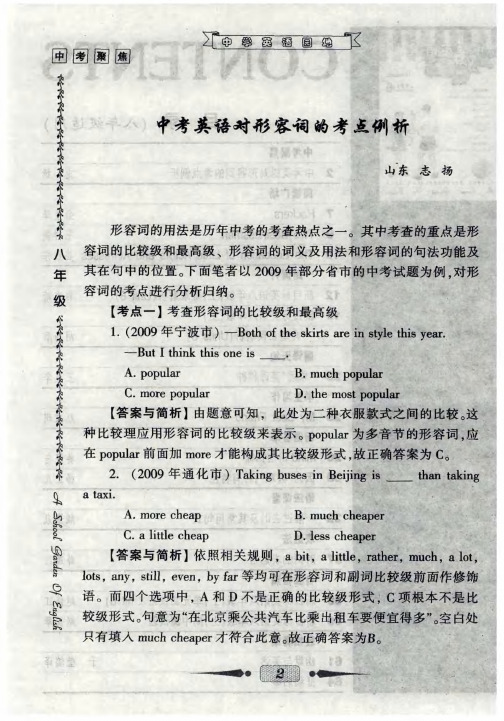
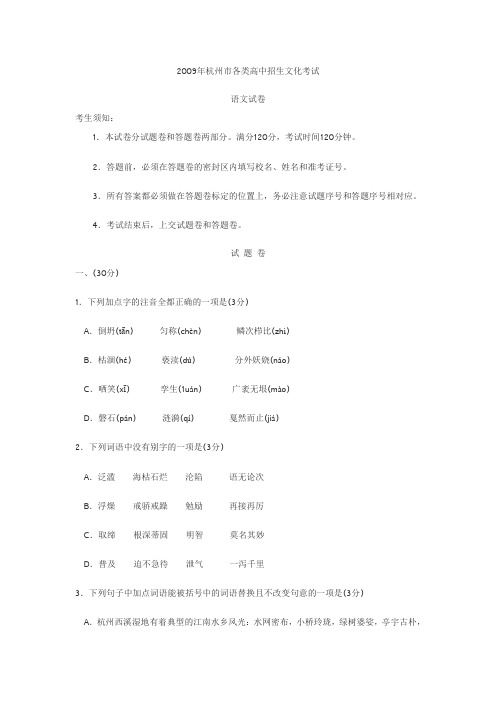
2009年杭州市各类高中招生文化考试语文试卷考生须知:1.本试卷分试题卷和答题卷两部分。
满分120分,考试时间120分钟。
2.答题前,必须在答题卷的密封区内填写校名、姓名和准考证号。
3.所有答案都必须做在答题卷标定的位置上,务必注意试题序号和答题序号相对应。
4.考试结束后,上交试题卷和答题卷。
试题卷一、(30分)1.下列加点字的注音全都正确的一项是(3分)A.倒坍(tān) 匀称(chèn) 鳞次栉比(zhì)B.枯涸(hé) 亵渎(dú) 分外妖娆(náo)C.哂笑(xī) 孪生(1uán) 广袤无垠(mào)D.磐石(pán) 涟漪(qí) 戛然而止(jiá)2.下列词语中没有别字的一项是(3分)A.泛滥海枯石烂沦陷语无论次B.浮燥戒骄戒躁勉励再接再厉C.取缔根深蒂固明智莫名其妙D.普及迫不急待泄气一泻千里3.下列句子中加点词语能被括号中的词语替换且不改变句意的一项是(3分)A.杭州西溪湿地有着典型的江南水乡风光:水网密布,小桥玲珑,绿树婆娑,亭宇古朴,处处富有诗情画意。
(典范)B.为了完善领导干部行为规范,健全党内责任追究制度,中共中央政治局审议并通过了《关于实行党政领导干部问贵的暂行规定》。
(审查)C.这伙人利用人民群众对党和政府的信赖,伪装成政府机关工作人员,到处招摇撞骗,其手段之卑劣已达到了登峰造极的地步。
(叹为观止)D.智者和愚者的区别,不仅仅在于天赋的差异,更在于面对困境,愚者往往束手无策,而智者却能化解困难,走出一条新路。
(一筹莫展)4.填入下面横线上的句子,排列恰当的一项是(3分)千岛湖畔的油茶树,生就了一副怪脾气。
冷寂的秋天在油茶花的映衬下,多了好些妩媚。
同在秋天开放的菊花,古往今来,受到多少人的歌吟和追捧。
而油茶花却安贫乐道,不慕虚华,更有君子气。
①这花,如秋叶般静美,不慌不忙,从从容容绽放。

2009年全国中考英语真题汇编——补全对话八、单词拼写(共10小题,计10分)根据下列句子及所给单词的首字母,在答题纸上按题号写出各单词的完全形式(每空限填一词)。
71. One h is the number 100.72. I’m really t . I’ve got to go to bed.73. Peter doesn’t like. It tastes too s .74. Normally, water boils at a t___________ of 100℃.75. Would you mind c__________ the door? It’s cold outside.76. His legs were so weak that he could h stand.77. If it r tomorrow, they won’t have the party in the open air.78. --- Shall we meet on W___________ or Thursday?--- Either day is fine with me.79. One day people will f to the moon for vacation.80. In this zoo there are a lot of a__________, such as monkeys, tigers and birds.参考答案:八、71. hundred 72. tired 73. sweet 74. temperature 75. closing76. hardly 77. rains 78. Wednesday 79. fly 80. animals(2009年杭州市各类高中招生文化考试A巻)VI.口语应用。
(每小题1分,共5分)阅读下面对话,从方框内7个选项中选择5个恰当的句子完成此对话,并将其番号填入B: Thank you very much.( )A: ______72_______B: In Qingdao.( )A: Qingdao? ______73_______B: Last week. I went there with my family.A: How long did you stay there?( )B: _____74_____ We went sightseeing in many places.( )A: We all know the beaches of Qingdao are very beautiful. _____75______B: Yes. When I was lying on the beach. I felt so cool and relaxed.( )A: ____76______B: I’m sure you’ll love to.参考答案:VI.口语运用。
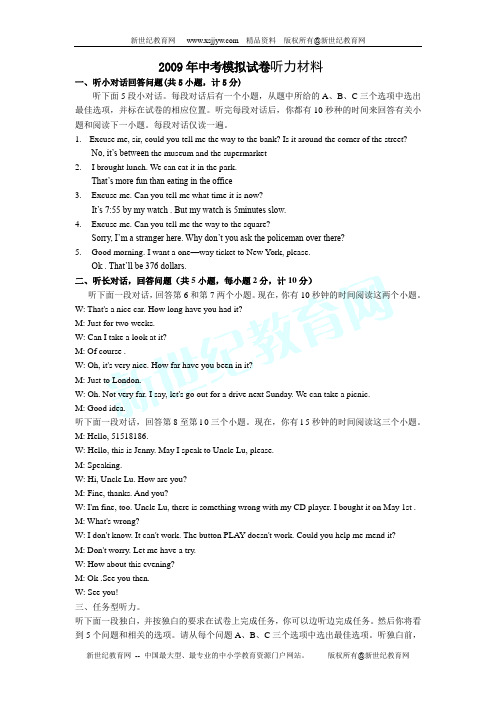
2009年中考模拟试卷听力材料一、听小对话回答问题(共5小题,计5分)听下面5段小对话。
每段对话后有一个小题,从题中所给的A、B、C三个选项中选出最佳选项,并标在试卷的相应位置。
听完每段对话后,你都有10秒种的时间来回答有关小题和阅读下一小题。
每段对话仅读一遍。
1. --Excuse me, sir, could you tell me the way to the bank? Is it around the corner of the street?-- No, it’s between the museum and the supermarket2. -- I brought lunch. We can eat it in the park.-- That’s more fun than eating in the office3. -- Excuse me. Can you tell me what time it is now?-- It’s 7:55 by my watch . But my watch is 5minutes slow.4. -- Excuse me. Can you tell me the way to the square?-- Sorry, I’m a stranger here. Why don’t you ask the policeman over there?5. -- Good morning. I want a one—way ticket to New York, please.-- Ok . That’ll be 376 dollars.二、听长对话,回答问题(共5小题,每小题2分,计10分)听下面一段对话,回答第6和第7两个小题。
现在,你有10秒钟的时间阅读这两个小题。
W: That's a nice car. How long have you had it?M: Just for two weeks.W: Can I take a look at it?M: Of course .W: Oh, it's very nice. How far have you been in it?M: Just to London.W: Oh. Not very far. I say, let's go out for a drive next Sunday. We can take a picnic.M: Good idea.听下面一段对话,回答第8至第l 0三个小题。

萧山区金山学校2009学年第二学期期初测试卷九年级英语听力部分(25%)一、听对话,回答问题(共5小题,计5分)听下面5段对话。
每段对话后有一个小题。
从题中所给的A、B、C三个选项中选出最佳选项,并标在试题的相应位置。
听完每段对话后,你都有10秒钟的时间来回答有关小题和阅读下一小题。
每段对话仅读一遍。
1. How long will the woman stay in Beijing?A. Two daysB. Two monthsC. Two weeks.2. With whom may the man go climbing?A. BettyB. HelenC. Alice3. What will Bob do when he graduates from school?A. Study in a university in China.B. Go on business.C. Go abroad.4. Where’s the manager’s office?A. On the second floor.B. On the first floor.C. On the fifth floor5. How long will it take to fly from Beijing to Wuhan?A. An hour and fifty minutes.B. An hour.C. Two hours.二、听长对话,回答问题(共5小题,计10分)听下面一段对话,回答第6和第7两个小题。
现在,你有10秒钟的时间阅读这两个小题。
6. What color is Celia’s bedroom this time?A. Green.B. BlueC. Yellow.7. What color was Celia’s bedroom in the past?A. YellowB. RedC. Green.听下面一段对话,回答第8至第10三个小题。
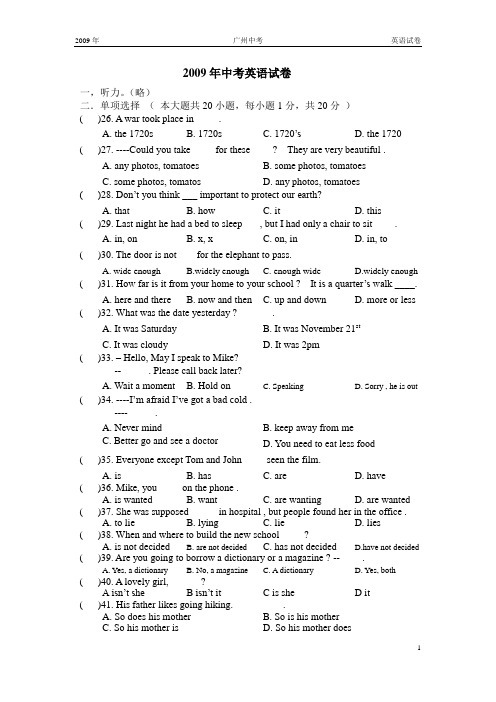
2009年中考英语试卷一,听力。
(略)二.单项选择(本大题共20小题,每小题1分,共20分)( )26. A war took place in ____ .A. the 1720sB. 1720sC. 1720’sD. the 1720 ( )27. ----Could you take ____ for these ____? They are very beautiful .A. any photos, tomatoesB. some photos, tomatoesC. some photos, tomatosD. any photos, tomatoes( )28. Don’t you think ___ important to protect our earth?A. thatB. howC. itD. this( )29. Last night he had a bed to sleep ___, but I had only a chair to sit ____.A. in, onB. x, xC. on, inD. in, to ( )30. The door is not ___ for the elephant to pass.A. wide enoughB.widely enoughC. enough wideD.widely enough ( )31. How far is it from your home to your school ? It is a quarter’s walk ____.A. here and thereB. now and thenC. up and downD. more or less ( )32. What was the date yesterday ? _____.A. It was SaturdayB. It was November 21stC. It was cloudyD. It was 2pm( )33. – Hello, May I speak to Mike?-- _____. Please call back later?A. Wait a momentB. Hold onC. SpeakingD. Sorry , he is out ( )34. ----I’m afraid I’ve got a bad cold .---- _____.A. Never mindB. keep away from meC. Better go and see a doctorD. You need to eat less food( )35. Everyone except Tom and John ____ seen the film.A. isB. hasC. areD. have ( )36. Mike, you ____ on the phone .A. is wantedB. wantC. are wantingD. are wanted ( )37. She was supposed _____ in hospital , but people found her in the office .A. to lieB. lyingC. lieD. lies( )38. When and where to build the new school ____ ?A. is not decidedB. are not decidedC. has not decidedD.have not decided ( )39. Are you going to borrow a dictionary or a magazine ? -- ____.A. Yes, a dictionaryB. No, a magazineC. A dictionaryD. Yes, both ( )40. A lovely girl, ______?A isn’t sheB isn’t itC is sheD it( )41. His father likes going hiking. ________.A. So does his motherB. So is his motherC. So his mother isD. So his mother does( )42. Our teacher told us the sun ____ in the east .A. riseB. roseC. risingD. rises ( )43. Let’s ___ play in the street . Father tells me ____ do so.A. not to ….. not toB. not …not toC. don’t , to notD. not to …don’t ( )44. I’ll go for a walk with you if it ____ tomorrow.A. won’t rainB. doesn’t rainC. will rainD. not rains ( )45. The old man is ill and he doesn’t feel like _____.A. to eat somethingB. to eatanythingC. eating somethingD. eatinganything三.完形填空(本大题共10小题,每小题1分,共10分)Water is the __46___ of all the things we eat and drink. Not many people understand this but __47____ quite true. The human body can go without ___48___ for a long time. W e’ve got many examples for this. Yet two __49___ three days without water can usually make people __50____ . Man can’t live __51____ water.Many peopl e don’t understand how ___52__ water the human body needs __53___ work well , and many people , especially young people, do not drink enough , ___54__ in very hot weather . Our body has mostly water, about 65% to 75% . That is to say about two thirds of our body is water. When we do sports, some of the water will get away from our body . __55 _ we don’t drink some water , we won’t have enough water.An d if we don’t have enough water, we’ll feel tired and many of us will get ill . So you know how important water is to us .( )46. A. important B.most important C.more important D. different( )47.A. it’s B. its C. it D. is( )48.A. food B. water C. drink D. meat( )49.A . so B. And C. But D. or( )50. A. to die B. die C. to died D. died( )51. A. have B. with C. without D. in( )52.A. many B. much C. little D. few( )53.A. and B. the C. / D. to( )54.A. even B. ever C. almost D. hardly( )55.A. If B. For C. Since D. Because四. 阅读理解。
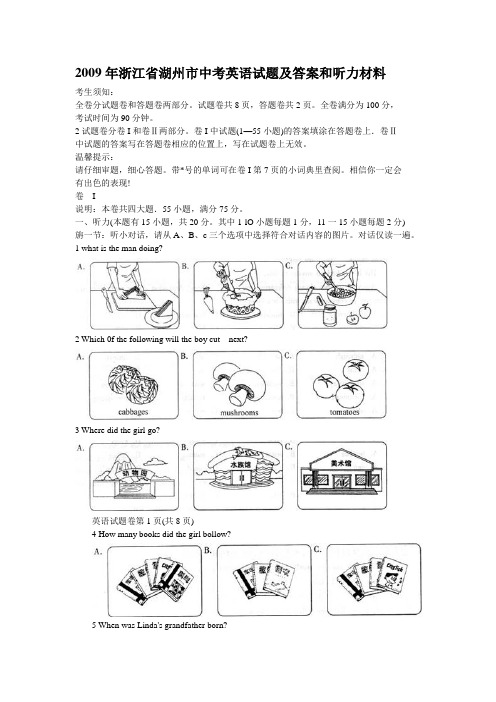
2009年浙江省湖州市中考英语试题及答案和听力材料考生须知:全卷分试题卷和答题卷两部分。
试题卷共8页,答题卷共2页。
全卷满分为100分,考试时间为90分钟。
2试题卷分卷I和卷Ⅱ两部分。
卷I中试题(1—55小题)的答案填涂在答题卷上.卷Ⅱ中试题的答案写在答题卷相应的位置上,写在试题卷上无效。
温馨提示:请仔细审题,细心答题。
带*号的单词可在卷I第7页的小词典里查阅。
相信你一定会有出色的表现!卷I说明:本卷共四大题.55小题,满分75分。
一、听力(本题有15小题,共20分。
其中1-lO小题每题1分,11一15小题每题2分)旃一节:听小对话,请从A、B、c三个选项中选择符合对话内容的图片。
对话仅读一遍。
1 what is the man doing?2 Which 0f the following will the boy cut next?3 Where did the girl go?英语试题卷第1页(共8页)4 How many books did the girl bollow?5 When was Linda's grandfather born?第二节:听小对话,请从A、B,C三个选项中选择正确的选项。
对话仅读一遍a6 What did Jack think of his first movie?A FunnyB ScaryC Boring7 Who wrote the Moonlight Sonata?A MozartB ChopinC Beethoven8 What is Jack going to be when he grows up?A A teacherB A doctorC A reporter9 Where are Tim and his friends going next Sunday?A To the parkB To the zooC To the museum10 Whose computer is broken?A David'sB Bill'sC Bob's第三节:昕独白.请根据独白的内容,从题中所给的A、B、C三个选项中选出正确的选项完成下面的信息记录表。

2009年浙江省嘉兴市中考英语试题卷I1 一、听力(本题有15小题,第一节每小题1分,第二、三节每小题2分;满分25分)第一节:听小对话,请从A、B、C三个选项中选择符合对话内容的图片。
1. What animal does Sally like best?2. What is Charlie doing?3. What does the man want to do?4. Which model is made by the man?5. When did John's parents come to see him?第二节:听长对话,回答问题听下面一段较长的对话,回答第6 ~7两小题。
6. What's wrong with the woman?A. She has a cold.B. She has a fever.C. She has a headache.7. What is the man's advice?A. To drink more water.B. To see a doctor.C. To take some medicine. 听下面一段较长的对话,回答第8 ~ 10三小题。
8. Where does the woman want to go?A. A cinema.B. A restaurant.C. A supermarket.9. How will the woman get there?A. By taxi.B. By bus.C. By bike.10. How long will it take if the woman walks there?A. About twenty minutes.B. About thirty minutes.C. About forty minutes.第三节:听独白.11. A. Bayi Lake12. A.7:00 am B.7:30 am C .8:00 am13. A. visit the gardens B. see Beijing Opera C. have a swim14. A. watches B. hats C. T-shirts15. A. bags B. umbrellas C. cameras二、单项填空(本题有10小题,每小题1分,满分10分)请从A、B、C、D四个选项中选出可以填入空白处的最佳选项。
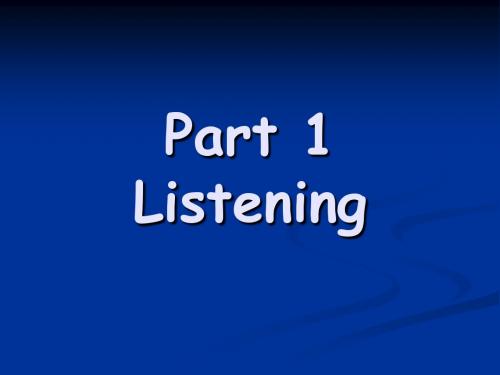

浙江省萧山区2009年中考英语模拟试卷6 1.本试卷分试题卷和答题卷两部分。
满分120分,考试时间100分钟。
2.答题前,必须在答题卷的密封区内填写校名、班级、学号、姓名、试场号、座位号。
3.所有答案都必须做在答题卷标定的位置上,务必注意试题序号和答题序号相对应。
4.考试结束后,只需上交答题卷。
听力部分(25分)一、第一节:听小对话,回答问题(共5小题,计5分)(出自2008中考模拟卷一)1. Where did the dialogue happen?A. In a shopB. In a libraryC. In a post office2. How many times does Tom go to see his grandparents in a year?A. OneB. ElevenC. Twelve3. What’s the weather like today?A. It’s sunny.B. It’s warm.C. It’s windy.4. What’s the date today?A. June 1stB. May 30thC. May 31st5. How many trees must be planted?A. 20.B. 25.C. 15.二、第二节:听长对话,回答问题(共5小题,计10分)(根据2008中考模拟卷二改编)听下面一段对话,回答第6和第7两个小题。
现在,你有10秒钟的时间阅读这两题。
6. What happened to Fred?A. A car hit him on the road.B. He hurt his right foot.C. He drove so fast that he hurt himself.7. What will the woman do next?A. She will try to help him walk.B. She will try to send Fred to hospital.C. She will go to a farmhouse for help.听下面一段对话,回答第8至第10小题。
2009年杭州市各类高中招生文化考试英语(A卷)考生须知:1、本试卷满分120分,考试时间100分钟。
2、答题前,在答题纸上写姓名和准考证号。
3、必须在答题纸的对应答题位置答题,写在其他地方无效。
1至60小题在答题纸上涂黑作答,答题纸答题方式详见答题纸上的说明。
4、做听力题时,先将答案划在试卷上。
录音内容结束后,你将有一分钟的时间将试卷上的答案转涂到答题纸上。
5、考试结束后,试卷和答题纸一并上交。
试题卷I. 听力部分(25分)一、听短对话,回答问题(共5小题,计5分)听下面5段对话。
1. What does the man think of the sweater?A. It’s too short.B. It’s very cheap.C. It’s expensive.2. Which is Allen’s phone number?A. 56568890.B. 56268890.C. 26268890.3. Why did Tom get up this morning?A. To do sports.B. To catch a train.C. To walk the dog.4. Where can the woman chemistry books?A. On the first floor.B. On the second floor.C. On the third floor.5. What would the woman speaker like to see in their school?A. M ore books.B. More libraries.C. More clubs.二、听较长对话,回答问题(共5小题,计10分)听下面一段对话,回答第6和第7两个小题。
6. Where is Lily going for lesson?A. In her school.B. In a language school.C. In an art school.7. What is she planning to do in France?A. To have fun.B. To improve her.C. To learn painting.听下面一段对话,回答第8和第10三个小题。
8. What is Rose busy with?A. Her trip plan.B. Her school exam.C. Her summer program.9. Who will go Rose?A. Bill.B. Her sister.C. Her classmate.10. How does Bill’s idea about camping?A. Good.B. Hard.C. Expensive.三、听独白,回答问题(共5小题,计10分)听下面一段独白,并按要求在试卷上完成任务,你可以边听边填写听到的数字。
*M = Month numberD = Day number5 (4 (5 M +6 ) + 9 ) + D = 100 M + D + 165,100 M + D + 165 – 165 = 100 M + D11. What subject is the speaker teaching?A. Chinese.B. Physics.C. Math.12. What should in Step 3?A. ×4.B. +6.C. +9.13. If someone was born, what get after Step 4?A. 44.B. 53.C. 265.14. What are you in your head after Step 7?A. +165B. -165.C. ×165.15. If someone was born on January 1st, what will be the result like?A. 165B. 100.C. 101.II. 笔试部分(95分)四、单项填空(共15小题,计15分)从A、B、C、D四个选项中,选出可以填入空白处的最佳选项。
16. Mary has _______ got it from her uncle.A. aB. anC. theD. 不填17. A mobile phone of this type costs too much. You’d better _______.A. waitB. waitingC. waitedD. to wait18. – What a beautiful drawn!-- ______A. You’re great.B. I’m proud of you.C. Not at all.D. Thank you.19. It is five years since we began to enjoy a ______ spring holiday each year.A. ten-dayB. ten dayC. ten day’sD. ten-days20. No hurry. The arrive _______ twenty minutes.A. atB. afterC. inD. by21. ---I’m sorry. I didn’t do a good job.---That’s OK. You your best ______.A. after allB. in allC. at allD. first of all22. Why not come over? My family seeing you again.A. enjoyedB. would enjoyC. will enjoyD. have enjoyed23. ---Do you know Alice?---Yes. I know _______ very well.A. sheB. herselfC. herD. hers24. Don’t talk loudly at the meeting. If you ______, you will have to leave.A. areB. doC. didD. can25. – ______ are you talking about?-- Something about the A(H1N1) flu.A. WhatB. WhereC. WhyD. How26. --- Tina, you know what? W can have a dog!--- Great! But I prefer to have a cat. It is _to take care of.A. easyB. easierC. easiestD. the easiest27. The teacher asked _______ a story about a trip to the moon.A. get upB. turn upC. clean upD. make up28. --- Shall I tell John about it?--- No, you ______. I told him just now.A. needn’tB. can’tC. mustn’tD. shouldn’t29. Is that the man ______ after the earthquake?A. whoseB. whichC. whenD. who30. Nick ______ a job in a bank, he didn’t take it.A. is offeredB. offeredC. was offeredD. has offered五、完形填空(共15小题,计15分)通读下面短文,掌握其大意,然后在各题所给的四个选项(A、B、C和D)中选出一个最佳选项。
It was very cold outside my car. I did not want tot of it 31 we passed by a cafe. SuddenlyI noticed a short old man, 32 , shaking with the cold. He was waiting for anyone who would33 him a coin or a cup of hot tea.I asked my 34 to go over and hand this old man something. He 35 into my husband’s face, smiled and said, “36 .” I felt so happy could live 37 the cold night.I was sure to meet him again and find out how he was the next 38 , as I have to pass this way every day. I did so the next evening, and he the 39 and came up to my window and 40 at me. This offered him a 41 of food. He reached out for the bag and I gave him my hand. He42 food, smiled and said, “May you.” I and he 43 me think of my father.”I do hope all of us will remember that maybe one day, it could happen to one of us, 44 please do not pass by a 45 person without least a word of love and a kind smile or an act of kindness of any kind.31. A. after B. when C. before D. if32. A. covered B. tied C. filled D. provided33. A. send B. leave C. greet D. accept34. A. father B. son C. husband D. friend35. A. watched B. knocked C. came D. looked36. A. Excuse me B. Beg your pardon C. Take it easy D. Thank you37. A. in B. through C. under D. off38. A. year B. month C. week D. day39. A. office B. gift C. car D. shop40. A. smiled B. pointed C. called D. shouted41. A. box B. bag C. bottle D. basket42. A. held B. ordered C. dropped D. received43. A. got B. forced C. made D. allowed44. A. so B. and C. or D. but45. A. quiet B. sick C. poor D. shy六、阅读理解(共15小题,计30分。